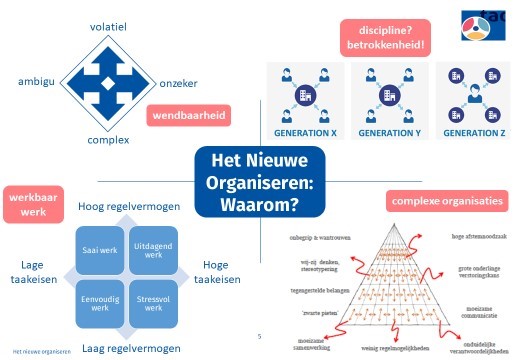More than just old wine in new bottles?
In any case, it is striking that every author, every organisation and every consultant who ventures into this field uses the same core principles, subject to their own emphases: putting the primary core process back at the centre and subsequently organising teamwork around this process with as much autonomy and involvement and as little hierarchy or dependencies as possible.
There is one myth that needs to be debunked: The New Organisation is not that new at all. Self-managing teams and the so-called mini-companies from the Lean culture were already hip in the last decades of the last century. In those days, Stanwick also built up a broad expertise, which led to the publication in 2004 of the book: ‘Sturen naar zelfsturing: bezielend ontwikkelen van een teamgerichte organisatie’ by Nick Vanhalst, Director of Stanwick.
Four social trends that challenge the ‘old’ forms of organisation.
What is true, however, is that the need for this other way of organising has continued to grow in recent decades, and roughly speaking, we can identify 4 major trends for this:
- Organisations operate in environments of increasing volatility, uncertainty, complexity and ambiguity (VOCA). From a certain scale, the agility this requires can no longer be guaranteed by a limited group of ‘thinkers’ (management) generating the ideas and then controlling the execution by a large group of ‘doers’. In such environments, you need the shared intelligence and commitment of all employees, each with their own feelers for their own piece of that increasingly fast-changing and increasingly disruptive environment.
- In Flanders, meanwhile, the term ‘workable work’ is rampant, fuelled mainly by the combination of the ever-higher retirement age and the ever-increasing number of long-term sick people due to burnout and similar psychosomatic disorders. All too often, this leads to the simplistic short-term solution of reducing task demands for these roles or individuals. In the long term, this is not always the right approach: neither for the individual, for whom a lack of challenge can lead to apathy, nor for the organisation, for whom such reduced performance is often not desirable in the longer term. Academics such as Karasek and modern sociotechnics have shown that it is often more interesting to enhance (at least also) control ability with appropriate support and the right degree of autonomy. If we can empower people so that they do achieve their challenging work on their own, it leads to higher engagement and lower dropout rates.
- Many companies complain about the lack of discipline in their incoming young employees. They no longer listen or simply do what is asked of them. But can you blame them? This Generation Z was no longer brought up and taught on the basis of ‘sit, shut up and listen’. On the contrary, they were encouraged very early as children to take responsibility themselves and acquire knowledge independently through group and project work. You cannot expect them now to walk into the factory gates to carry out in a disciplined manner what someone else, the manager, the engineer or the senior engineer, has thought out for them. They want to help shape their job as they were allowed to help shape their learning path. In the War for Talent, which is already under way in some sectors but will soon rage worldwide, organisations will only be able to attract and retain employees by focusing on commitment. Only those who really feel involved in the decisions concerning their job will carry them out in a disciplined way.
- Moreover, because of the VOCA environment (see 1) and communication technology, the organisation itself has also become very complex: there is so much information flowing around, that the classic pyramid cannot process it. Organisations groan under untold amounts of email traffic and meetings to keep all departments and teams involved in a process informed and aligned. This interdependence between departments often slows down, paralyses and frustrates. Organisations are therefore looking for new structures in which the dependencies and necessary interactions between departments can be reduced. The solution often lies in building polyvalent teams around core processes, instead of the classic organisation into specialist silos.

From hype to a form of organisation with proven track record
All four trends seem sustainable and have only become more important over the past decades. Together, they have caused more and more organisations to start experimenting around this theme . In turn, all these cases have provided new literature, which in turn has inspired others to start experimenting themselves. So the hype is not entirely new, but the knowledge and expertise in this field has evolved considerably in the meantime and has proven its success and potential.
Over all these years,Stanwick has built up extensive expertise in designing organisations and developing self-directed teams. Moreover, we have ‘Senior Consultants in Innovative Work Organisations’, certified through the UAMS and Flanders Synergy vzw, where as ambassadors we also continuously exchange knowledge and expertise with other organisations active in this field. With all the recent new insights, we also recently updated our TAO model (Teamwork - Autonomy - Organisation) into a new TAO 2.0. With this tool, we can make a quick analysis of your organisation and search together for where opportunities for improvement lie.





